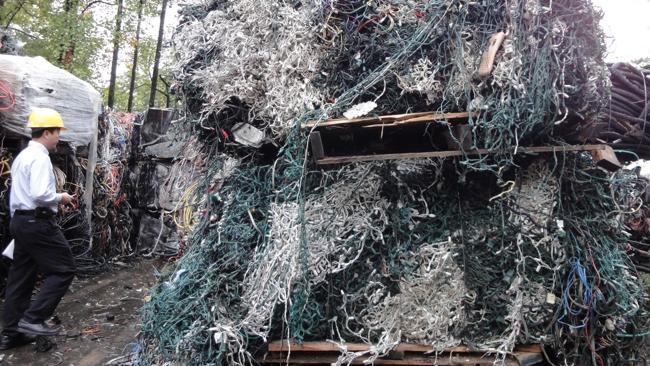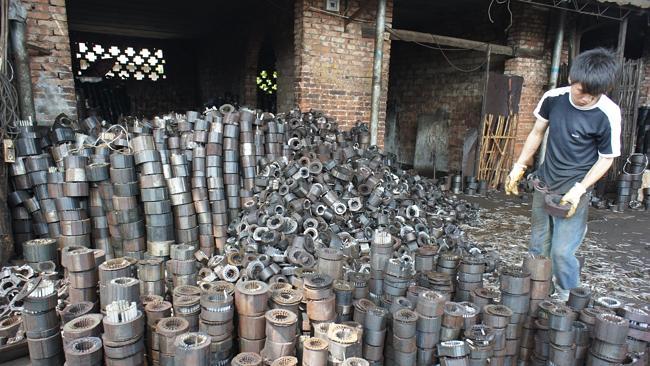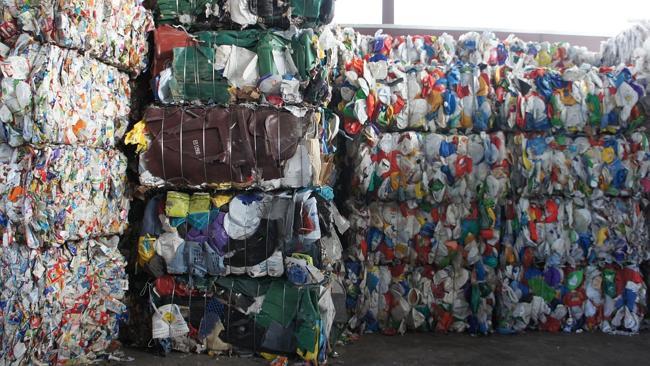Adam Minter's book Junkyard Planet tells fascinating story behind global scrapping industry
DENIM into dollars and iPhones into 'woodchippers.' Here's the surprising truth about the things you dump and the $500 billion rubbish industry.

Companies
Don't miss out on the headlines from Companies. Followed categories will be added to My News.
HAVE you ever wondered what really happens to all your rubbish? Or where your iPhone goes to die?
Chances are it's being sold back to you in ways you would never imagine.
Levis jeans into US dollars, Christmas tree lights into flip flops, old newspapers into shoeboxes, it's all part of the $500 billion dollar rubbish trade Adam Minter details in his book Junkyard Planet.
"If you drive a car the aluminium engine block comes from recycled aluminium, especially if it's an American or Chinese built car. The bumpers, the tail-lights, this is not a niche thing. It's very much part of a global supply chain," he said.
Mr Minter grew up in a family of "scrappers" in Minneapolis, who would pick up old goods and sell them on for a profit, as part of a global trash trade he believes will surpass $1 trillion dollars in the next few years.
"My earliest memories are wandering through a warehouse looking at treasures in boxes of junk from old plumbing to factory scraps, there's always something interesting in there," he said.
"Scrapping" also known as "junking" or "grubbing" is different to council-run rubbish collections, in that scrappers look for things they can resell and make a profit.
"You may have yourself a truck, go down neighbourhood streets and buy whatever they have. Maybe they did a renovation and have some old plumbing pipes lying around."
"You pack it and it goes to the next stage which could be a large scrapyard or smelter or paper mill, to turn into new paper or cardboard … It's searching for value and upgrading the value," Mr Minter said.

The ethos of looking for treasure in other people's trash has led him to become a global authority on an industry that is the fascinating flip side of a consumer society.
It's second only to agriculture in terms of the number of people it employs around the world, and handles around 600 million tonnes of recycling each year, according to the Bureau of International Recycling.
Scrapping is also responsible for producing 40 per cent of the world's raw materials as everything from wires to phones, plastics, metal and copper can be melted down and reused.
"Big mining companies are watching and paying very careful attention to recycled materials, they're competition for virgin materials. Those are very real factors in global economy. I even sometimes forget how big it is. It's not just cute sustainable gift packages you get at the gift shop, it's everything and everywhere," Mr Minter said.

Australia plays a surprisingly big role. It's home to bases for two of China's largest scrapping companies that routinely ship containers full of wires, metal, copper and paper that can be worth up to $US100,000 each.
In China they will be resold, sorted or broken down to provide new materials in an industrious way of dealing with cast offs from the developed world.
"If you're going to recycle an iPhone in Australia, the protocol for recycling is to shred," Mr Minter said, adding Apple would "put it in a glorified woodchipper" where lasers and infra-red would be used to sort valuable parts.
However in China the same phone would be sold second hand or disassembled by hand to pull out valuable parts that could be reused.

"There's this image of stuff being dumped on the developing world and that we're exploiting them to clean up," he said. "[But] they're taking the stuff the developed world has not seen any value in then turning it around and selling it back," he said.
Mr Minter said he's reluctant to start evangelising about recycling, but the best way to reduce rubbish is to curb consumption.
"Recycling is not your get out of jail card. It's a way to allow the planet to allow us to continue this consumption based society. But if you're coming at this from a sustainability perspective the best thing you can do is reduce consumption …. Stop buying so much crap."
Read more about Adam Minter and his book Junkyard Planet on his blog.
###



